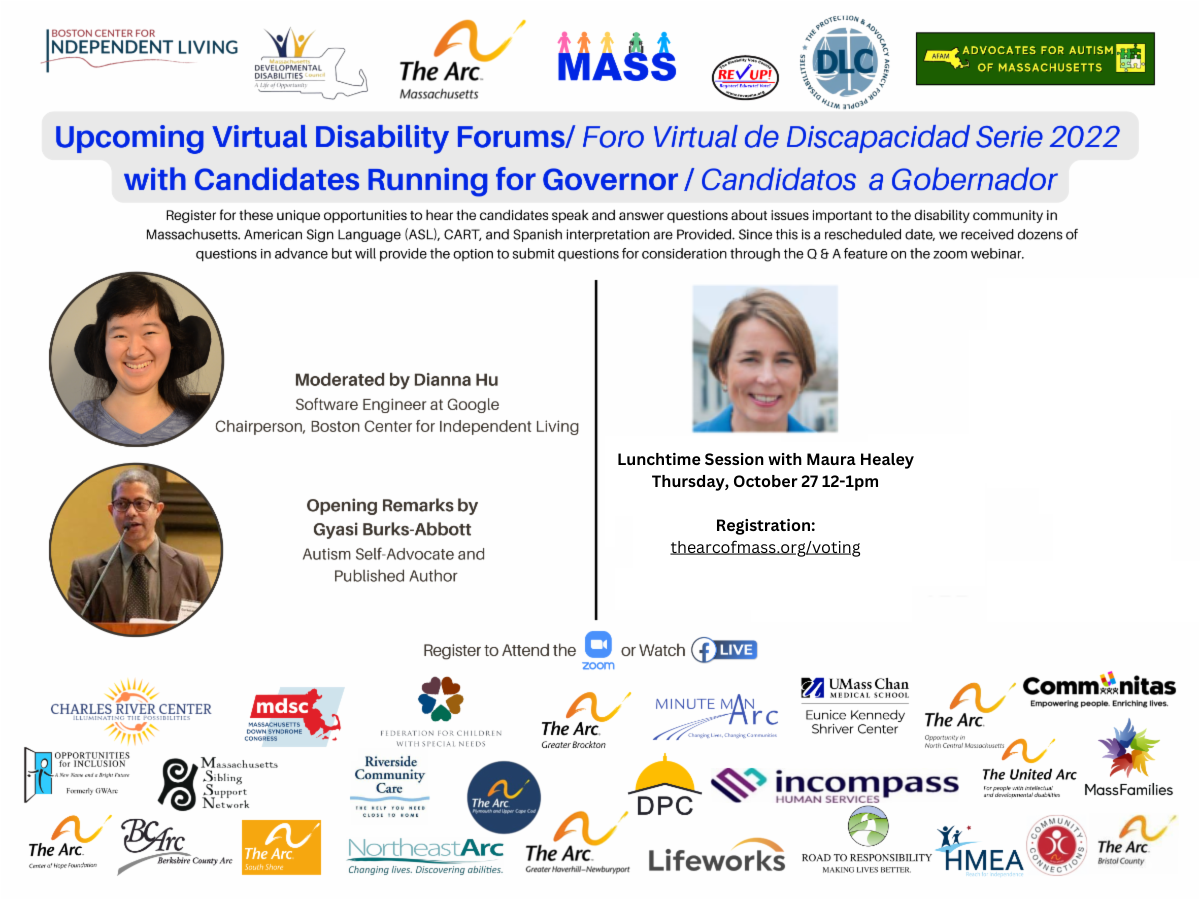Question One: I want to start the questions today with an education question. The question is this: how will you work to ensure that Massachusetts schools drop the practice of segregated classrooms for students with disabilities, and move to a more inclusive education for all, especially in urban school districts and also beyond?
Maura Healey (D): Thank you for this question. Obviously, chapter 766 is really important. We know that segregated classrooms limit the opportunities of students with disabilities to access academic and extracurricular activities, and as a result, they suffer. That is just not right. We know also that most students with disabilities can succeed and really succeed in inclusive classrooms with the proper supports and accommodations. So here is what I think we need to do in Massachusetts. I know that just a few years ago, maybe in 2017, the National Council on Disability found that Massachusetts, along with maybe New Jersey and Connecticut had the highest rate of placement and residential programs. We need to start by training teachers and educators on finding ways to better integrate special education with the regular classroom experience. Training, training, training. Next, I think we need to analyze the placement data. I want to know across school districts and cities and towns and other communities, I want to know placement rates so we can uncover any disproportionate placement practices for students. So I think those two things are really important. I would welcome a review of how effectively Massachusetts is upholding the individuals with the Disabilities Education Act, which we know is intended to protect students with disabilities from classroom and school segregation. Finally, I will continue to be an advocate at the federal level to receive federal funding for the resources we need in order to uphold our obligations under law.
Question Two: How would you work toward ensuring that successful transition for all students with disabilities that are turning 22 and now are in need of adult services?
Maura Healey (D): Well, I think the first thing is let’s recognize and emphasize that work has to begin and be built out long before a student turns 22. We need to be working on education and employment plans for students with disabilities long before they turn 22. And that means getting students into the educational programs through the years that meets their competency and allow them to maximize and reach their full potential before they turn 22. I know that life after 22 looks different for all of us, but for everyone may have an obligation to make sure that students are given the resources along the way. I also think that in addition from back to being my mindset around this, the work has to start day one students enter into learning, we also need to build our resources at DDS. Unless there are resources at DDS, we are not going to have the resources there to best assist students and their families. Of course, family as so critically important in the planning process and making sure they are getting connected with the appropriate adult services for their individual needs. Again, I mentioned pipeline. This is an area where we really need to build up pipelines for these students around employment opportunities.
I want to work to make sure we are connecting students with affordable education, fulfilling employment opportunities, and finally, housing, making sure students have access to affordable and accessible housing. I think we know what we need to do, but it is a matter of driving that intentionality and with urgency. You know, it breaks my heart to think of instances where a young person is, life is going to change at 22, and the fact of the matter is that we as a state have an obligation to make sure we are doing everything we can for that person and their family so they have the opportunity. I just don’t want to see instances where people fall through the cracks. Obviously, more work to do around employment, around housing, and of course the resources all the way through the years before 22 to get people to where they need to be.
Question Three: What would be the Healey administration’s plan for funding to support wages and benefits and recruitment for personal care attendants for clinical staff and other essential direct service workers?
Maura Healey (D): I know there is a workforce crisis across so many sectors right now in our state. But perhaps no sector is experiencing it more than human services and health care right now. The consequence of that, where people are relying on that care, is just absolutely devastating. It is pretty clear we need to invest in workforce. We need to go out, recruit, train up and develop a pipeline of future PCAs and other direct care workers. That includes building out programs and vocational schools and community colleges as well as in our high schools. Mary Driscoll and I recently announced a program, Mass Reconnect, and this is a program that will make job-training available to residents 25 years and older who may not be in the workforce but can be brought back into the workforce to be trained and receive a certification to go out and fill some of these incredibly important positions. It is aimed at helping older and nontraditional students complete their education and train them for good jobs and human services, healthcare, and the like. Those are some of the things we need to do. And obviously, this comes down to pay. I recognize any number of people who have left jobs that are so critically important, where you are taking care of a human being. What is more important than that? To go work at places like Amazon and Target that pay more. This gets to what we value as a state. And I value people. We need to make sure we are there with the incentives the end we have done the work to grow this workforce. I don’t want to hear another story, and I heard too many, of too many folks not able to go today programs or participate in activities they use to participate in, simply because of workforce issues.
Question Four: Will you support the PCA program and work with advocates and labor representatives to strengthen rather than reduce the program?
Maura Healey (D): Absolutely. Absolutely. The team and I in the Attorney General’s office sued the Trump Administration when they tried to undermine the bargaining power of tens of thousands of Massachusetts PCAs. I have been a proud supporter of the Workforce Council and made sure it had representation from the disability community. I have been very proud to be I think the first candidate for governor in over a generation to receive the endorsement of every SEIU local in Massachusetts, which represents our PCAs. I have been able to spend a lot of time with PCAs over the last many years, as well as clients, to hear the stories. It is a no-brainer. Of course we need to do that. You are just an example of why this is so absolutely critical. So what, as Governor, I am going to continue to stand up for the tens of thousands of home care workers who are providing vital care, compassionate care, and to ensure that people are able to live independently, to live safely, to live with dignity. This is absolutely what we need to do. That includes addressing the issues of compensation and recruitment.
Question Five: What will you do to improve transportation for the disability community?
Maura Healey (D): This is really important. Just as a general matter, we don’t have a functioning economy without a functioning public transportation system. I have been really clear about my plans for that in the investments we need to make so we have a public transit system that is safe, that is accessible, reliable, and affordable. And obviously, there are big scale projects we discussed in the state that I support the funding for, but also paying attention to the work of our RTAs RIDE and other programs. We have to do this. It should never be the case that people are unable to access the public transportation that they are absolutely entitled to access under law. I know this is a struggle at times for people with disabilities with some of the wait times and the lack of services. I want to work on that. I know the Department of Systemwide Accessibility, working on advancing equal access and compliance with ADA rules. That is something that is very important, and I will work to support that department. I will work to support resources for RIDE, and well beyond that as well, but this also gets to work force issues because we need people there to provide these services. I was actually, the other day I was out at campus at UMass Amherst. They have a great engineering department there, and one that is focused on transportation, and what they wanted to show me and what I wanted to see was some of the incredible work they are doing using cameras that are on robotic chairs that help capture what obstacles a person in a wheelchair may encounter when getting around a built environment. The goal is to address that and make that more accessible. That is just an example of something happening right here in the state, work we need to invest in and do.
Look, I am a civil rights lawyer. I am still a civil rights lawyer from the Civil Rights Division. You know, dealing with cases that have been filed where people didn’t have access to housing, to jobs, to transportation. These are the basic building blocks of life. Education, right? As Governor, I promise you I will do everything in my power to make sure that no person with a disability is denied any of those experiences.
Question Six: I want to ask if your administration will support initiatives to hire people with disabilities in state government, including establishing concrete goals and holding agencies to established metrics?
Maura Healey (D): Absolutely. Look, first of all, everyone deserves the opportunity for employment. I am going to make sure that we are doing everything we can to ensure that people with disabilities have access to meaningful employment, employment that they are going to not only benefit from in terms of financial independence, which is so important, but also that reflects who they are and all they can be about. That means education. That means the resources we talked about. That means the supportive resources. And the other thing is, we need a thriving workforce in this state. I mentioned to you the number of jobs that are open and available. This is in our collective interest to do everything we can to grow a workforce. I think that we need to make sure we are strengthening all the connections out there. The connections that exist between the Department of Labor, Mass Rehabilitation Commission, Commission for the Blind and Deaf and Hard of Hearing, DDS, and also the private sector. I think we can be doing more with that. I think we can be doing more and expanding our educational opportunities early on, whether through vocational education and training or other programs, to give people with disabilities skills and knowledge they need to benefit. Also from what are emerging as new jobs and opportunities in this state. The advent of technology has been a game changer in so many respects. We just need to everything we can to expand those employment opportunities and training for that. Then the partnerships where employers, yes, including state agencies and entities that should be held accountable, but also our private employers who can see the win-win in all of this. I think sometimes things that get in the way our funding and lack of imagination. I am not going to let either of those things impede us any further in terms of barriers for people with disabilities when it comes to employment.
Question Seven: How will you support self-direction for people with disabilities in getting their services and supports?
Maura Healey (D): I absolutely support a self-direction model that helps people with disabilities and their families make informed choices. We know that there really should be a recognition that there needs to be a range of options. Because we are all different, with similarities, but as human beings we are all individuals. So what is it we need to do to make sure we are out there with the options supporting people with disabilities and having the options available to them to make the decisions about how they receive their care and how they utilize their services? And what is going to work best? What supports are going to work best for them and their families? People of all ages with all types of disabilities should be able to maintain their independence at home. You know, I think that is why, if you look at something like that Real Lives Law that was passed is so important. It was intended to expand self-direction services and that model here in the state. That is something we need to support. I have heard that there’s a lot more work we need to do to better implement the law, and I am committed to working with all of you, as I know Mayor Driscoll is, and making sure that happens. I know we want to empower DDS and the self-determination advisory board to receive constructive feedback so we can do what needs doing.
Maura Healey (D): Thank you for having me on with all of you here today. It has been great to be able to share a little bit of my perspective on things. Just know that I am driven to this work because I believe in the people of our state, all of the people of our state, and I believe great things are possible here in the Commonwealth of Massachusetts if we work together. We have a lot going for us in this state. We have through the years two important civil rights legislation, initiatives and efforts, and advocacy, yes, including litigation, brought by some represented on this call, we have got things to a certain place. But we have so much more work to do. I promise you that as Governor I will hear you, see you, listen to you, meet you where you are, and I will work every day to find ways to when it comes to the issue of disability rights and folks with disability in our state, I will do everything I can to support with resources, with education, with training, with lifting up and amplification so that people understand more about the wonderful richness and vibrancy across the disability community. I hope I am not defending anyone, because it is not a monolith, it is a community with lots of variation and different needs and experiences, but just know that as Governor I am going to do everything I can to support. Because we deprive ourselves as a Commonwealth when we fail to recognize the dignity, the worth, and the capacity of each person in this state. I want to work hard to eliminate any barriers that exist when it comes to education, healthcare, employment, housing, transportation for people with disabilities and their families. That is something I promise to do. I will only be successful if Mayor Driscoll and I are able to do that in partnership and collaboration with all of you. Thank you for the work you continue to do.
One thing I found really important in leading an organization is representation matters. I am just committing to you that not only do we have a strong and robust boards, commissions and agencies that are specifically focused on issues of disability, but I think as important is we need to have representation from the disability community across boards and agencies and commissions generally. And I think with that, we are going to be able to move further ahead. People will see and better understand. You are at the Google today. Thank God you are doing the work you do as a software engineer. We are lucky to have you. We want to keep you in Massachusetts. I think that kind of exposure is very important. And one way I think the executive branch can help do that is who it decides to put on various boards and agencies and commissions across a range of sectors and spaces. There will be representation. I will be looking for and asking for representation if elected from the disability community.




